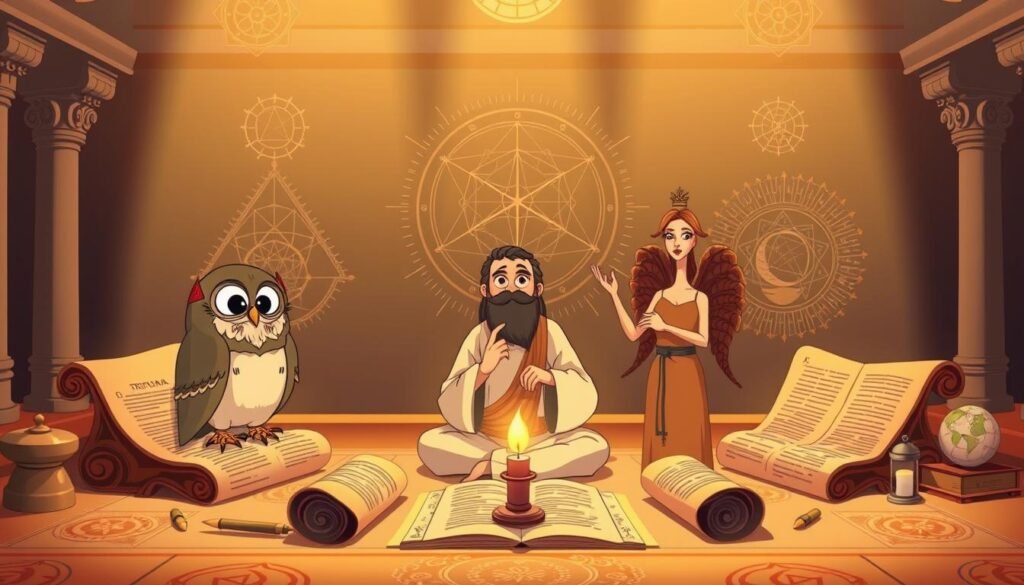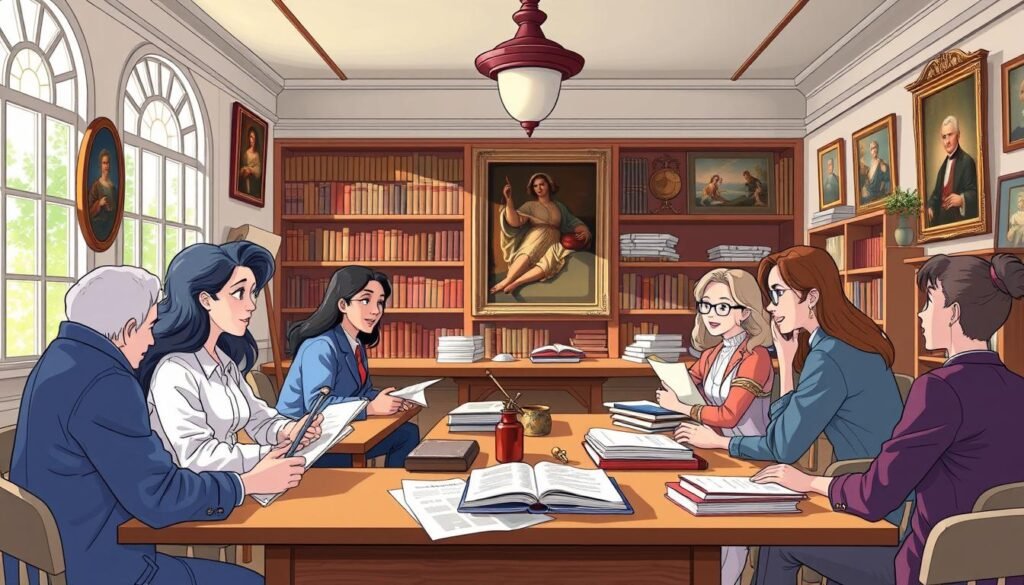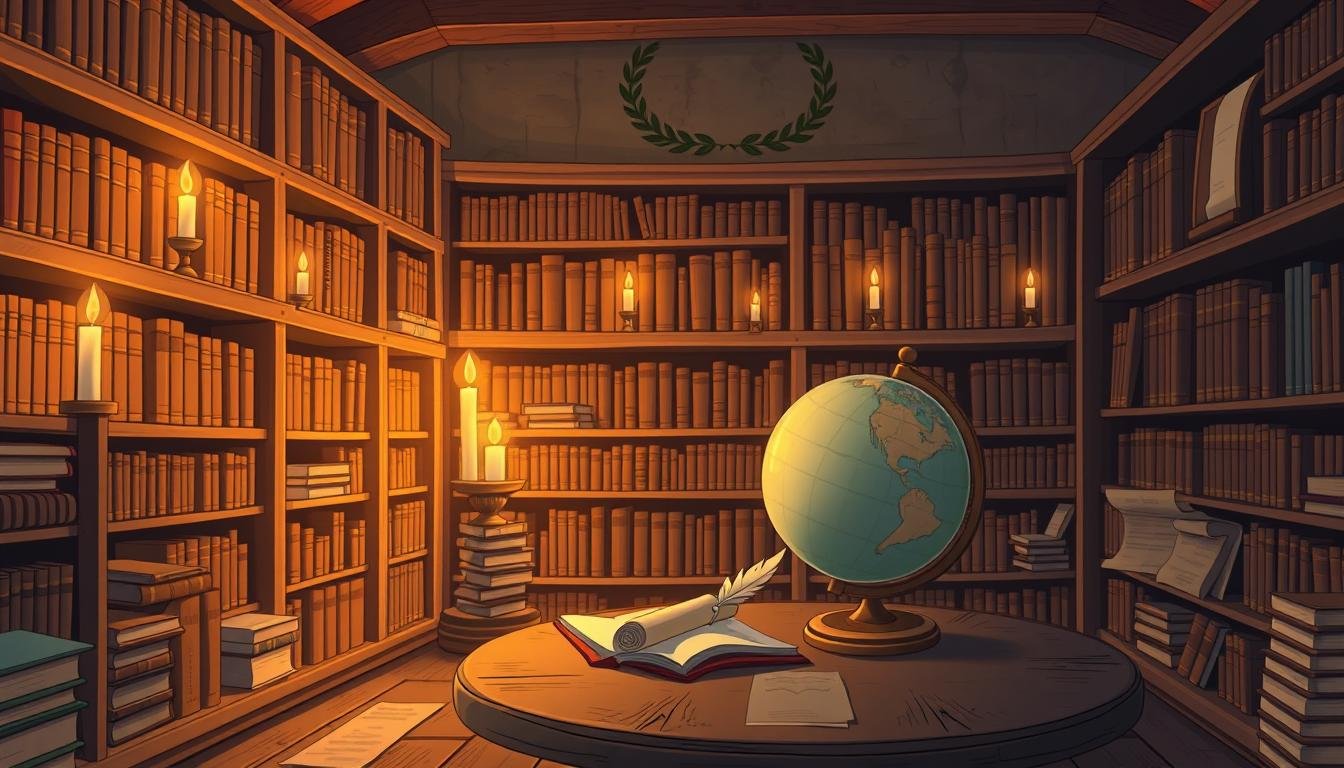Could reading literature change how we see the world and shape our moral and spiritual growth? In a time when education needs a big change, Classical Christian Education offers a deep approach. It combines intellectual challenge with the importance of passing on culture, helping students face big life questions.
The idea of paideia, or education as learning a culture, is key to this philosophy. By adding reading literature to the curriculum, Classical Christian Education aims to teach wisdom and virtue. It connects students to their faith and the world around them. This approach, rooted in ancient Greece and Rome, uses the Trivium and Quadrivium to educate in a way that still works today.
This article will explore how these elements help shape the next generation. It shows the importance of literature and philosophy in education. They help create a well-rounded, virtuous person ready for today’s challenges.
The Essence of Classical Christian Education
Classical Christian Education is all about building a biblical worldview called Paideia. It shapes how education happens, matching with how kids grow. It’s not just about learning facts but also about growing morally, spiritually, and culturally.
Christian Classical Schools aim to raise students who live by seven Christian virtues. They learn to join the big conversations of history through the Great Books.
This education focuses on Moral Formation. Students learn to think deeply and speak well through the Trivium method. This method includes Grammar, Logic, and Rhetoric.
It makes sure students can express their thoughts clearly. This skill helps them serve others, a key part of classical Christian education.
In these schools, teaching from a Christian perspective is key. It helps students develop a love for learning and a heart for God. By linking theology to all subjects, students see knowledge through a biblical view. This prepares them to face life’s challenges with faith.
An Overview of the Liberal Arts Tradition
The Liberal Arts Tradition is a key educational framework. It combines different subjects to give students a well-rounded education. This approach focuses on Educational Core Principles found in Classical Education.
Students learn to think critically and appreciate the arts. They also grow morally. This mix helps them become well-rounded individuals.
Understanding the Core Principles
The Liberal Arts Tradition emphasizes analytical skills and ethical thinking. These skills help students achieve academic success and develop their character. Dr. Kevin Clark and Ravi Jain highlight the importance of these principles for students’ growth.
They believe these principles are crucial for today’s students. For more information, check out The Liberal Arts Tradition: A Philosophy of Christian Classical.
The Role of the Liberal Arts in Education
The Role of Liberal Arts in education goes beyond just learning subjects. It helps integrate knowledge across different areas. This tradition prepares students to be thoughtful citizens.
As educators today say, the liberal arts improve both intellectual and emotional growth. In a classical curriculum, this integration gets students ready for future studies and community involvement.
The Historical Context of Classical Education
Classical education has its roots in Ancient Greece. It was there that the basics of education were laid down. These ideas still shape how we teach today.
The Historical Education Context shows how the Greeks’ idea of paideia was all about growing a person. It covered mind, body, and spirit. This idea is still a key part of modern education.
Tracing the Roots to Ancient Greece
In Ancient Greece, Socrates and Plato were big names. They stressed the need for good speaking, thinking, and moral education. These ideas are still at the heart of Educational Foundations.
Education was about learning to think deeply. Socratic questioning helped students find truth. Later, learning Latin and Greek became key for understanding classic texts.
The Influence of Medieval Thinking
The move from Ancient Greece to the medieval period changed education a lot. Medieval Education and Scholasticism mixed old ways with new ideas. Thomas Aquinas was a key figure in this mix.
He combined faith and reason in education. This approach made learning more than just knowing facts. It aimed to make people better and wiser. The work of medieval scholars shows why traditional education is still important today.
Classical Christian Education Reading Literature Philosophy
Adding philosophy to Classical Christian Education makes learning richer. It gives students a clear way to dive into important books. This mix of Philosophy in Education helps them grasp Classical Thought better.
It also helps them see how to use it in their studies. Students start to think deeply about big questions like existence, morality, and life’s purpose. This helps them become better thinkers.
Integrating Philosophy with Education
Philosophy and education go hand in hand in making thoughtful people. By focusing on Educational Integration, students see how philosophy helps them understand books better. This way, they learn to share their thoughts clearly.
Learning through philosophy is like a path from knowing to wisdom. It helps them grow in understanding and thinking.
The Importance of Literature in the Classical Curriculum
Literature is key in Classical Christian education. It teaches through timeless classics. Reading these books helps students think critically and imagine morally.
It also helps them deal with big questions and choices. By reading these texts, students can share their own spiritual growth. This makes them more committed to learning and growing.
Practical Applications of the Liberal Arts Tradition
The Practical Liberal Arts make learning better in schools today. Teachers use old-school ideas to make learning fun and meaningful. A key book, “The Liberal Arts Tradition” by Kevin Clark and Ravi Scott Jain, helps understand these ideas.
This book offers a model called PGMAPT. It covers Piety, Gymnastic, Music, Arts, Philosophy, and Theology. It aims to grow students in many ways, like their minds and spirits. The book is short but packed with useful information.
Many schools are now using this model. It helps teachers and students alike. Sales figures and adoption rates show it’s becoming more popular. Teachers love it, making it a big hit in education.
Integration of Trivium and Quadrivium in Learning
The Trivium and Quadrivium are key to classical education. The Trivium includes grammar, logic, and rhetoric. These tools help develop Classical Skills.
Grammar lays the foundation for language. Logic builds critical thinking. Rhetoric sharpens communication skills.
Students learn to think deeply and communicate well. This goes beyond what regular schools teach.
Developing Skills through Grammar, Logic, and Rhetoric
Grammar helps students master language. They learn Latin and English grammar well. This boosts their language skills.
Logic teaches critical thinking. It’s crucial for making good decisions. The Socratic method sparks curiosity and love for learning.
Rhetoric helps students express their thoughts clearly. It also improves study habits and self-discipline.
The Role of Arithmetic, Geometry, Music, and Astronomy
The Quadrivium adds to classical education with arithmetic, geometry, music, and astronomy. These subjects are connected, like ancient knowledge categories. They help students see how different areas relate.
Many classical education students do well in college. This is thanks to the broad knowledge they gain. They also appreciate beauty and excellence, seeing the world through a Christian lens.

The Importance of Transmitting Culture
Cultural Transmission is key in education, especially in Classical Education. It helps pass on values, beliefs, and ethics to the next generation. An Educational Mission focuses on creating a school culture that values Christ. This way, students can connect with their heritage and the world today.
Education has changed a lot, moving from Greek and Roman to Christian teachings. This change made us think differently about cultural elements. Early Christian leaders like Tertullian wondered if classical studies fit with Christian faith, asking, “What has Athens to do with Jerusalem?” (
Tertullian, De praescriptione haereticorum 7:9
). They saw a clash between classical freedom and Christian equality, as shown in Galatians and Leviticus.
Now, we see classical learning as part of Christian education. Jerome’s journey from doubt to acceptance shows this shift. Schools focus on Cultural Transmission to raise morally and spiritually strong individuals.
Private schools like Hillsdale Academy aim to fulfill this mission. They offer a mix of classical studies and practical skills. This prepares students for a complex world, showing education’s role beyond just learning.
Classical Education helps individuals grow and strengthens community bonds. It ensures values are passed on in a meaningful way. Augustine’s advice to “plunder the Egyptians” reminds us to integrate knowledge while staying true to Christian teachings.
For more, check out how classical education relates to today. It shows our ongoing search for balance in education.
Developing Moral and Spiritual Formation
Classical Christian Education focuses on more than just learning facts. It aims to shape students’ ethics and spiritual values. This approach helps students understand moral complexities and live by scriptural teachings.
The Role of Piety in Education
Piety is key to moral and spiritual growth. It teaches students to respect God and build a relationship with the divine. This is vital for facing life’s ethical challenges.
When education values piety, students make choices based on their faith. This ensures their actions reflect their true beliefs.
Discussing piety in education shows its importance. It combines moral and spiritual learning. This way, students not only do well in school but also grow in virtues.
This balanced approach prepares students for the world’s complexities. It enriches their educational journey.
The Contribution of Modern Thinkers to Classical Education
Modern Influencers are key in shaping Classical Education. Thinkers like Dorothy Sayers and Mortimer Adler have sparked renewed interest in this old yet valuable educational approach. They stress the need for a strong curriculum that draws from ancient wisdom but stays relevant today.
Sayers emphasizes the importance of a classical education. She believes in focusing on grammar, dialectic, and rhetoric. These elements help develop critical thinking and intellectual engagement.
Influences from Dorothy Sayers and Mortimer Adler
Sayers and Adler have greatly influenced the comeback of classical education. They highlight the value of direct instruction and memorization skills for retaining knowledge. Adler’s Great Books series promotes classical literature, aiming to foster wisdom through questioning and debate.
This approach aligns with classical education’s focus on lifelong learning. It goes beyond just preparing students for jobs.
Contemporary Perspectives on Classical Education
The modern conversation on Classical Education shows a variety of views. As more students choose classical education, numbers are expected to grow by 2035. Teachers are now blending classical methods with today’s educational needs.
This shift includes updating curricula to meet modern standards. It also aims to enhance critical thinking and moral development. The goal remains to educate well-rounded individuals.

Challenges and Opportunities in Classical Christian Education
Classical Christian education faces many challenges in today’s world. New technologies and cultural changes make it hard to stay relevant. Yet, between 1992 and 2000, over 100 classical Christian schools opened, showing growing interest.
The Association of Classical Christian Schools (ACCS) was started in 1994. It aims to lead this educational movement. By 2008, the ACCS had about 200 schools, showing its growth.
Between 2008 and 2018, a new generation of schools focused on virtue and feelings. They drew from ancient thinkers like St. Augustine. This shows the potential of classical education, despite its challenges.
Now, classical and Christian schools are seen as safe havens from radical left ideas in regular schools. The fight against nihilism, as discussed by Strauss, is a big concern. Many American universities now teach nihilism, showing a gap from traditional values.
Parents are looking for a solution to society’s problems through classical education. It aims to give a complete view of learning, unlike today’s systems. As classical education grows, it tackles both its problems and chances, staying important in today’s education debates.
The Future of Classical Christian Education
The future of Classical Christian Education looks bright for growth and change. Many classical Christian schools are seeing more families stay. This shows a chance to make education better and more appealing.
It’s key to keep the core values of classical education while also being modern. Schools need to attract Christian families who might see public schools as cheaper. But, classical education offers something special that public schools can’t match.
There’s a big challenge in today’s world. Religion is seen as private, not part of education. This is a problem for schools that want to teach faith and values. Works like John Henry Newman’s “Discourses on the Scope and Nature of University Education” highlight this issue.
This lack of spiritual education can harm students’ faith and learning. It shows that a good education must include faith and values.
The Classical Christian Schools movement is growing fast, with over 300 schools worldwide. This is a great chance to change how people see education. By showing what classical education offers, schools can win back interest. They can prepare students to make a difference in the world with a strong faith base.
FAQ
What is Classical Christian Education?
Classical Christian Education focuses on truth, goodness, and beauty. It aims to develop students intellectually, morally, spiritually, and culturally. This prepares them for life’s complexities.
How does the concept of paideia relate to this educational approach?
Paideia is about education as a way to pass on culture. It’s key in Classical Christian Education. It uses literature and philosophy to form morals and spirits, linking education to culture.
What are the core principles of the Liberal Arts Tradition?
The Liberal Arts Tradition values critical thinking, moral virtue, and beauty. It uses a wide curriculum that combines arts and sciences.
Who were some key philosophers that influenced Classical Education?
Socrates, Plato, and Thomas Aquinas were crucial. They showed the importance of reason and faith in education. Their ideas shape Classical Christian Education.
What role does literature play in Classical Christian Education?
Literature is key in classical education. It helps students think critically and imagine morally. It also helps them understand God’s creation.
What is the Trivium and how is it applied in education?
The Trivium includes grammar, logic, and rhetoric. These skills are the foundation of Classical Education. They help students communicate and analyze well.
How does the Quadrivium extend the framework of Classical Education?
The Quadrivium adds arithmetic, geometry, music, and astronomy. It gives a broad intellectual education. It helps students understand the world from a Christian view.
Why is the transmission of culture important in education?
Passing on culture is crucial. It creates a school that values Christian principles. It helps students engage with society morally and culturally.
What is the significance of moral and spiritual formation in Classical Christian Education?
Moral and spiritual growth is central. It guides students in ethics and faith. It helps them face life’s challenges with piety.
How have modern thinkers contributed to the reinvigoration of Classical Education?
Dorothy Sayers and Mortimer Adler revived interest in Classical Education. They promoted a strong curriculum that blends ancient wisdom with today’s relevance.
What challenges does Classical Christian Education face in modern contexts?
Classical Education faces challenges like fitting into modern standards and changing needs. Yet, these challenges offer chances for new approaches and teaching methods.
What does the future hold for Classical Christian Education?
The future looks bright for Classical Christian Education. Schools are adapting while staying true to classical values. They aim to prepare students to make a difference in society.

Rockin’ the faith, one verse at a time!
Growing up, the Bible’s stories deeply impacted me. Now, with over 15 years of preaching experience, I blend timeless teachings with modern technology, making them relevant for today’s world.
Bible Hub Verse is my platform to share historical insights and thought-provoking articles, exploring both familiar and uncommon Christian topics. My passion is building a welcoming online space for everyone to learn, grow in their faith, and discover the Bible’s enduring message.
Join the journey!
God bless you.









